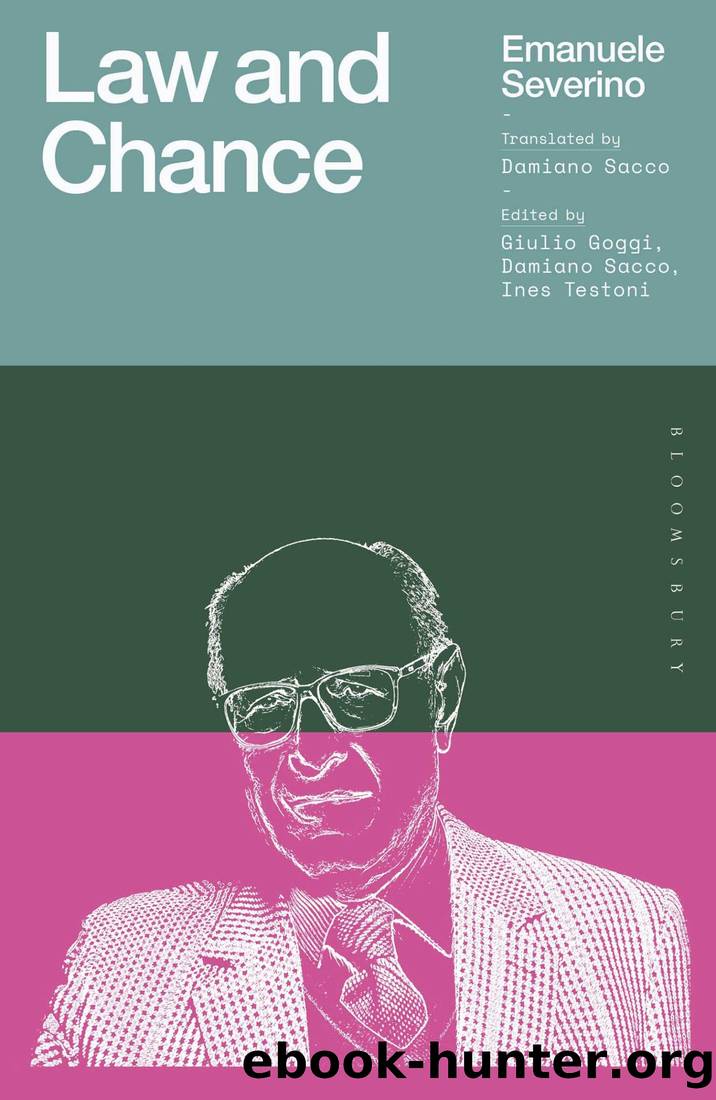Law and Chance by Emanuele Severino;

Author:Emanuele Severino; [Severino;, Emanuele]
Language: eng
Format: epub
ISBN: 9781350273153
Publisher: Bloomsbury UK
Published: 2022-11-15T00:00:00+00:00
3
The Protocol-Statement Debate
As a consequence of this assumption, it happens that, whereas in the initial empiricist phase of neo-positivism (Wittgenstein, Schlick) one still speaks of statements that have an absolute value (these are the statements that, in expressing immediate experience, are posited as the foundation of knowledge), in the revisionist phase (of which Neurath is the most convinced proponent) it comes instead to be denied that any statement should have an absolute value. And this is a legitimate consequence. Indeed, an intersubjective agreement exists among written or spoken statements â that is, among empirical and public events â and not among psychological processes that could only be controlled by the respective carriers. Among all statements, there undoubtedly exist those that indicate the immediate observations of various individuals; these statements (âprotocol statementsâ), however, serve as foundation for all other scientific statements not by virtue of their absolute value, but rather because, as a matter of fact, they are the least likely to be modified or replaced. This fact, however, does not rule out the possibility of their modification or replacement, for there are no incontrovertible criteria according to which it would be possible to rule out the possibility that the compiler of the protocol was mistaken, suffered from hallucinations, attempted to deceive, etc. If, that is, the principle according to which the assertions that express an immediate content of experience have an absolute value (this is the principle of phenomenology) is one of the fundamental determinations of the epistéme, it is also to be acknowledged that when these assertions become an empirical fact (a visible sign or a sound), insofar as this empirical value is held firm, their referentiality and their very meaning become a problem. The construction of intersubjective knowledge consists, precisely, in considering statements qua empirical facts. It is therefore entirely consistent that, within this construction, every absolutism should come to be refuted. The ultimate origin of every anti-absolutism, as well as of every conventionalism of (revisionist) neo-positivism, lies precisely with the project of elaborating the system of intersubjectively coordinated signs that constitutes science.
From this standpoint, the so-called âprotocol-statement debateâ, which comes to involve all the principal exponents of neo-positivist thought, is the most important and concurrently the most ambivalent development of the history of this movement. The importance is due to the emergence of a predominance â de facto and de jure â of a methodological stance over the philosophical-epistemic one. The ambivalence is due to the fact that both opposing factions are convinced of sharing the same reference frame, when in fact they move within different ones: the empiricist faction (led by Schlick) lays emphasis on the âphilosophicalâ question that concerns the necessity of positing an extralinguistic ground of intersubjective knowledge; the physicalist faction (led by Neurath) lays emphasis on the methodological question concerning the necessity of eliminating any extralinguistic reference for the construction of intersubjective knowledge. What actually takes place, below the level of awareness of the protagonists, is that the process, which throughout the history
Download
This site does not store any files on its server. We only index and link to content provided by other sites. Please contact the content providers to delete copyright contents if any and email us, we'll remove relevant links or contents immediately.
The Power of Myth by Joseph Campbell & Bill Moyers(1068)
A Social History of the Media by Peter Burke & Peter Burke(988)
Half Moon Bay by Jonathan Kellerman & Jesse Kellerman(987)
Inseparable by Emma Donoghue(983)
The Nets of Modernism: Henry James, Virginia Woolf, James Joyce, and Sigmund Freud by Maud Ellmann(914)
The Spike by Mark Humphries;(812)
The Complete Correspondence 1928-1940 by Theodor W. Adorno & Walter Benjamin(789)
A Theory of Narrative Drawing by Simon Grennan(783)
Culture by Terry Eagleton(776)
Ideology by Eagleton Terry;(743)
World Philology by(719)
Farnsworth's Classical English Rhetoric by Ward Farnsworth(715)
Game of Thrones and Philosophy by William Irwin(712)
Bodies from the Library 3 by Tony Medawar(709)
High Albania by M. Edith Durham(705)
Adam Smith by Jonathan Conlin(695)
A Reader’s Companion to J. D. Salinger’s The Catcher in the Rye by Peter Beidler(689)
Monkey King by Wu Cheng'en(654)
Comic Genius: Portraits of Funny People by(653)
